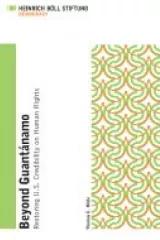Beyond Guantánamo - Restoring U.S. Credibility on Human Rights
How to restore the credibility of a country whose foundations and self-understanding are based on the universality of freedom and human rights, but that has violated precisely those rights by practicing torture in Guantánamo and other prisons around the world?
The image of the United States as a role model of liberal democracy has suffered tremendously over the last eight years. In the name of the global war on terror, former President Bush suspended the law for those detained as possible terrorists. Even though President Obama’s promise to close Guantánamo is recognized by the international community as a first step towards restoring U.S. credibility, several problems require comprehensive policy solutions:
How to proceed with detainees that are considered to be dangerous?
What to do with detainees who are cleared of suspicion, but might face torture in their country of origin?
How to cope with evidence that is derived from torture? Thomas C. Hilde outlines several post-Guantánamo detainee policy proposals – and their difficulties – that address these distinctive sets of issues, such as military commission trials, continued preventive detention, a national security court or U.S. criminal court trials.
In the long run, however, restoring credibility through a reformed detainee policy is only one component of post-Guantánamo credibility; the second indispensable element is accountability.
Prof. Hilde discusses the functions of different forms of accountability in the process of reestablishing U.S. credibility on human rights.
Whereas legal accountability requires the formal investigations of human rights violations, public-moral and pragmatic accountability refer to the need to address the norms on which international society is based.
Moreover, a public discourse is needed that confronts the stories of those who have suffered human rights violations and the empathetic aspect of human rights. A more comprehensive form of accountability can serve as both a means towards regaining U.S. credibility and a strengthening of human rights culture.
Thomas C. Hilde is a professor at the University of Maryland School of Public Policy where he teaches seminars in ethics and policy and international environmental and development law and politics. His most recent book is On Torture (editor). He is also editor (with Paul B. Thompson) of The Agrarian Roots of Pragmatism as well as the forthcoming Pragmatism and Globalization, and is currently writing a book on adaptive systems for post-Kyoto sustainable development.
